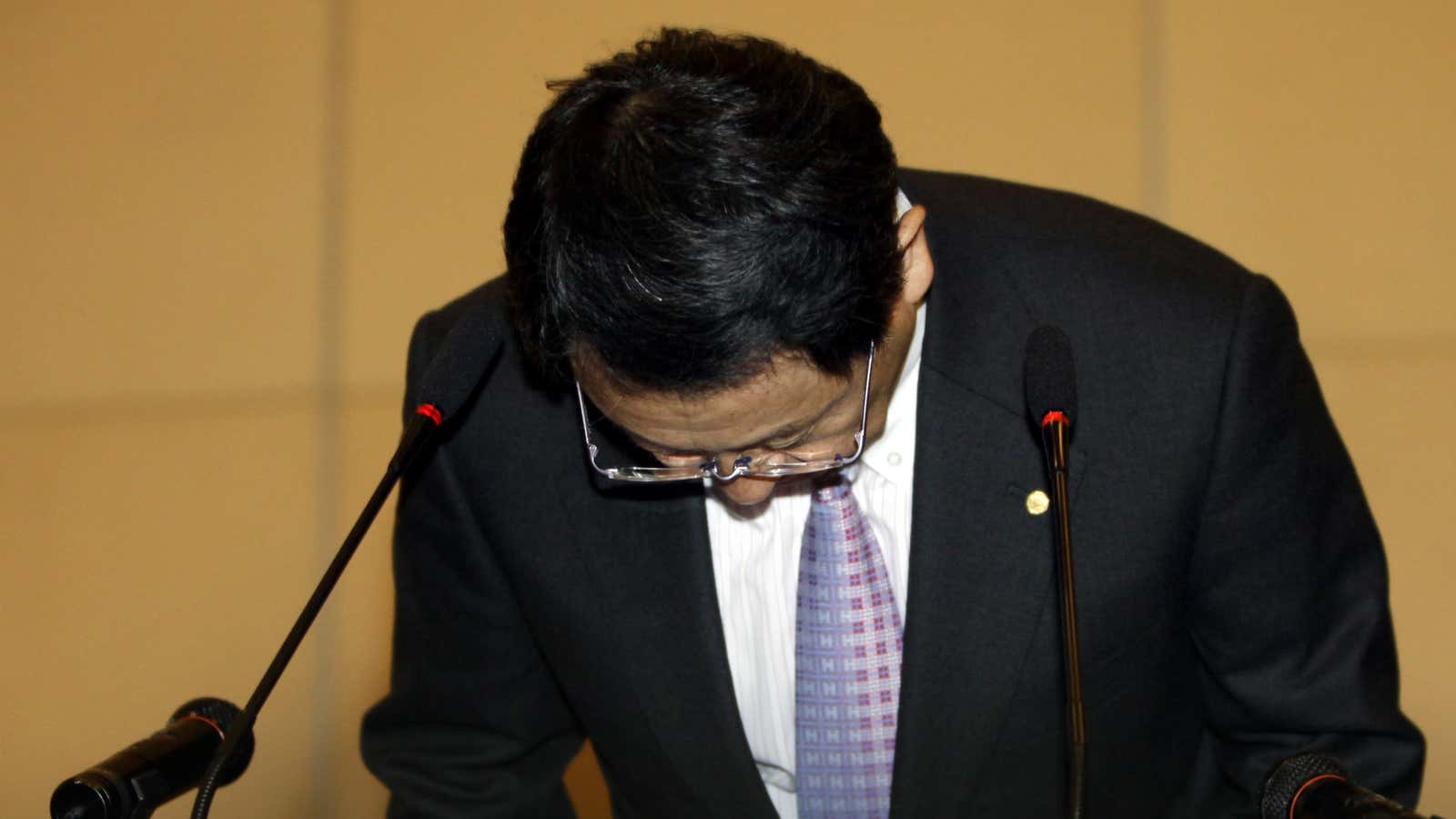Samsung has quickly apologized to China for selling faulty memory chips that allegedly caused its smartphones to malfunction—the latest in a long line of foreign firms that have asked forgiveness of China’s 1.4 billion people. In the case of Samsung, as in many of the corporate mea culpas, state media zeroed in on differences in the way Chinese customers were treated (Samsung wouldn’t provide free repairs or a replacement for phones with a memory chip problem, as it does in other countries) that it said was an injustice.
The public apology has often been a firmament of Chinese culture under the Communist Party, and politicians recently revived the tradition of public “self-criticism” sessions. Samsung’s approach seems so far to be an exemplary addition to the corporate apology genre: The company moved fast to accept there was a problem, said it “sincerely apologizes” for its own “management problems,” welcomed the media scrutiny, and pledged free maintenance and extended warranties for the phones affected by its manufacturing problems.
But not every company has been able to shape such a textbook response. Consider the following firms and their modus operandi:
We’re sorry you see things that way
Apple: In March, after more than a week of criticism in Chinese state media, CEO Tim Cook published a statement that was less about the subject of the criticism (the company’s warranty and repair services) and more about the way the company was perceived: “We realize that a lack of communication has resulted in a perception that Apple is arrogant and doesn’t care about consumer feedback. We deeply apologize for any apprehension or misunderstanding this has caused.”
Please, please don’t be mad
GlaxoSmithKline: In July, the Chinese government accused the UK drugmaker of bribing doctors and hospital officials to increase its sales. In less than a week, Glaxo issued an abject apology, even before admitting to any wrong-doing: ”We are deeply concerned and disappointed by these serious allegations of fraudulent behavior and ethical misconduct by certain individuals at the company and third-party agencies. These allegations are shameful and we regret this has occurred.”
Fonterra: In August, the New Zealand milk powder manufacturer Fonterra said it found bacteria in some of its plants that could possibly lead to food poisoning in some products. The company’s chief executive then raced to Beijing days later, where he said: “We really regret the distress and anxiety which this issue could have caused. We totally understand there is concern by parents and other consumers around the world.” At the end of August, Fonterra said new tests had shown that the dangerous bacteria was not present after all.
Toyota: After Toyota recalled cars worldwide in 2010 for acceleration and brake problems, president and CEO Akio Toyodo quickly came to China. ““The Chinese market is very important, so I flew here in person in the hope my personal expression of an apology and explanation will give customers some relief,” he said.
Too little, too late?
YUM Brands: The KFC parent company, which has thousands of outlets in China, was thin on details and slow off the mark when it said it regretted its own “shortcomings,” after food safety regulators found higher-than-normal levels of antiviral medicine in the company’s chicken in January. KFC’s sales, which had been boosted by a perception that its food was safer than the average fare in China, are still lagging 10 months later.
The Tibetan Climbdowns
Fiat: The Italian car maker apologized for an ad featuring actor and activist Richard Gere, in which the actor climbs into a FIat Lancia and drives to Tibet: “Fiat reiterates its neutrality in connection with any political matter, be it on a national or international basis. Fiat Group extends its apologies to the Government of the People’s Republic of China and to the Chinese people.”
Groupon: The US online sales site offended both China and supporters of Tibet with a 2011 Super Bowl spot that criticized Chinese policies and then noted that Tibetans “still make a great fish curry.” Groupon CEO Andrew Mason issued this classic non-apology: “We would never have run these ads if we thought they trivialized the causes—even if we didn’t take them as seriously as we do, what type of company would go out of their way to be so antagonistic?” (Mason was subsequently pushed out by the Groupon board.)
Christian Dior: Actress Sharon Stone blamed “karma” over China’s treatment of Tibet for the 2008 Sichuan earthquake, which killed more than 60,000 people. Her employer, Christian Dior, subsequently issued an apology in her name saying “I feel deeply sorry and sad about hurting Chinese people,” only for Stone to refute the apology.
It’s not you, it’s me
Mattel: Back in 2007, Mattel’s CEO blasted Chinese manufacturers after some of the company’s toys made in China were found to have dangerously high levels of lead. A few weeks later, one of its executives was forced to travel to China to take the blame for Mattel’s “weak safety controls,” saying “Mattel takes full responsibility for these recalls and apologizes personally to you, the Chinese people, and all of our customers who received the toys.”
